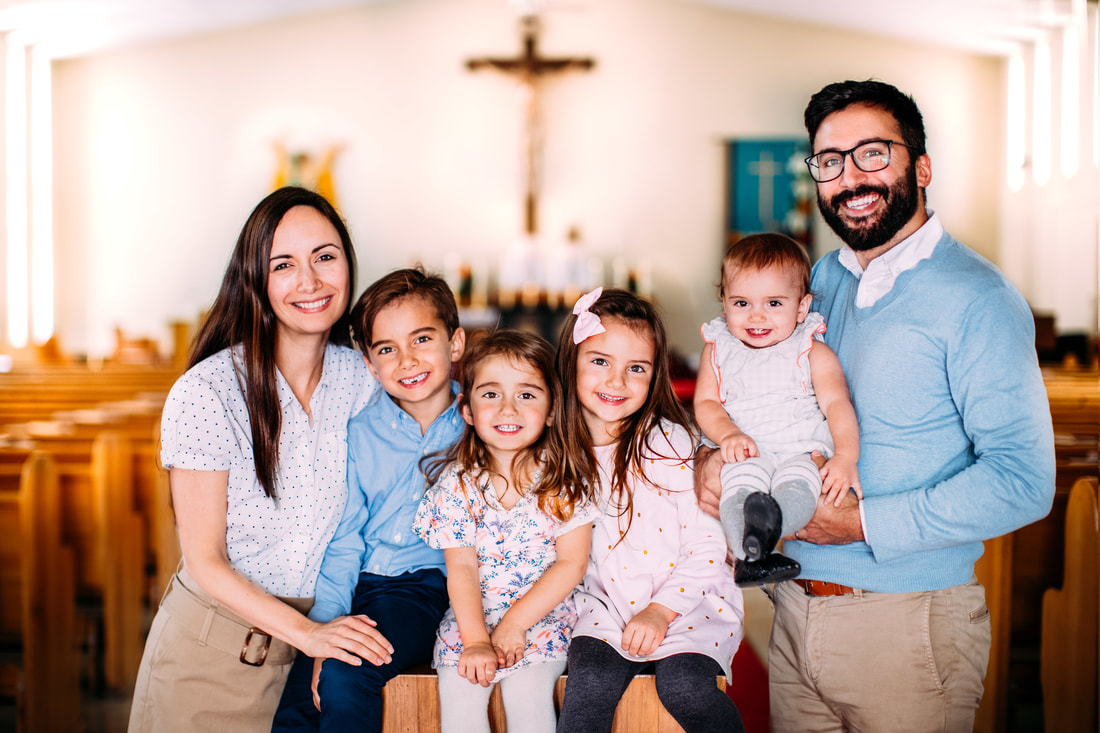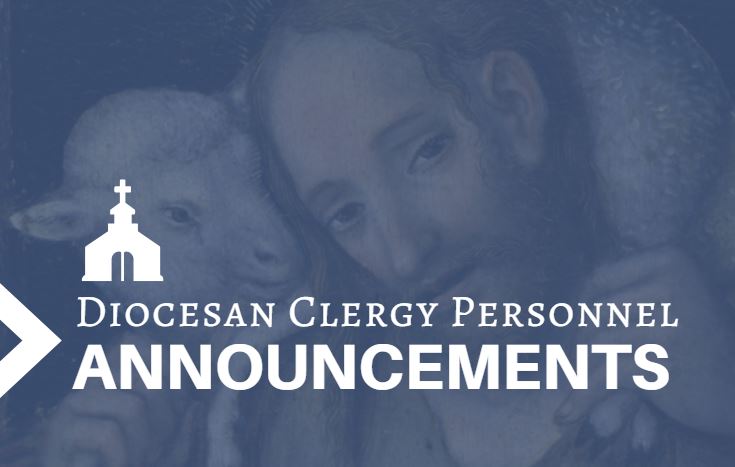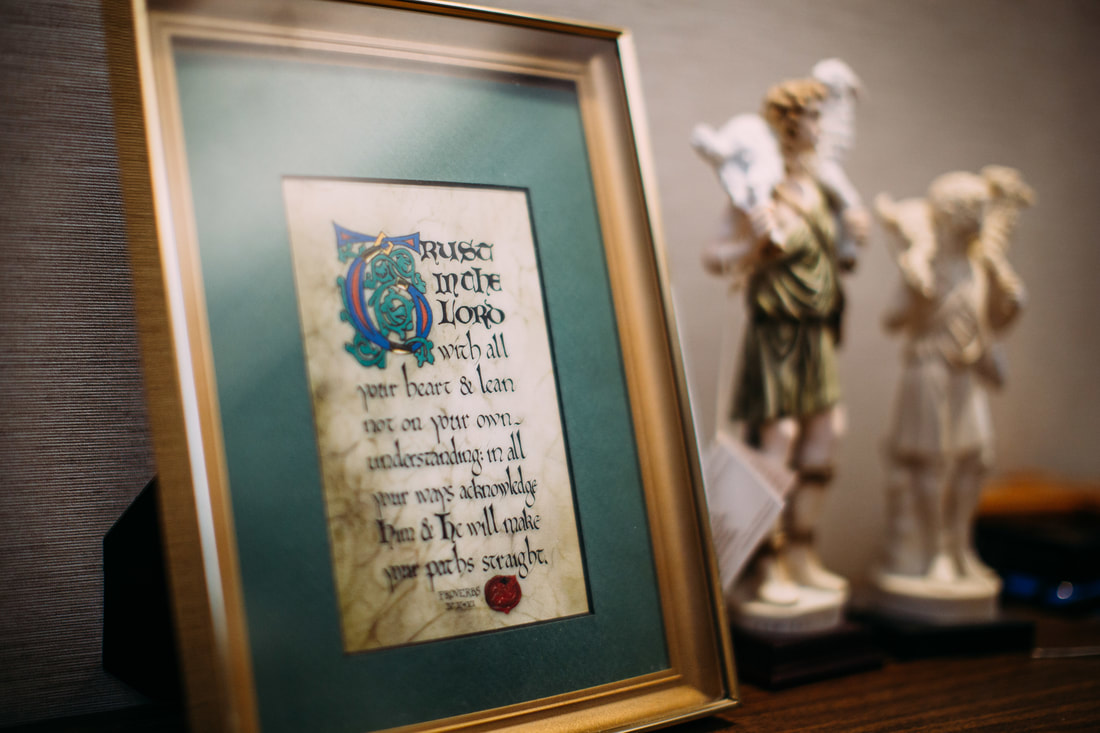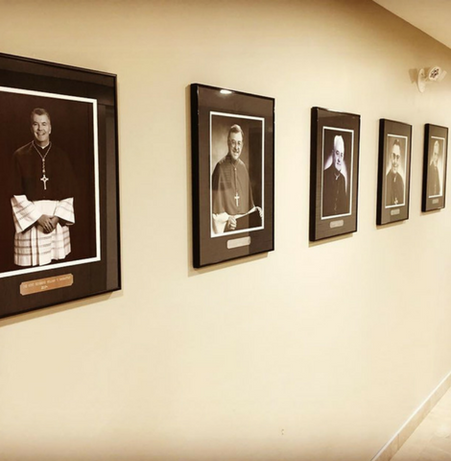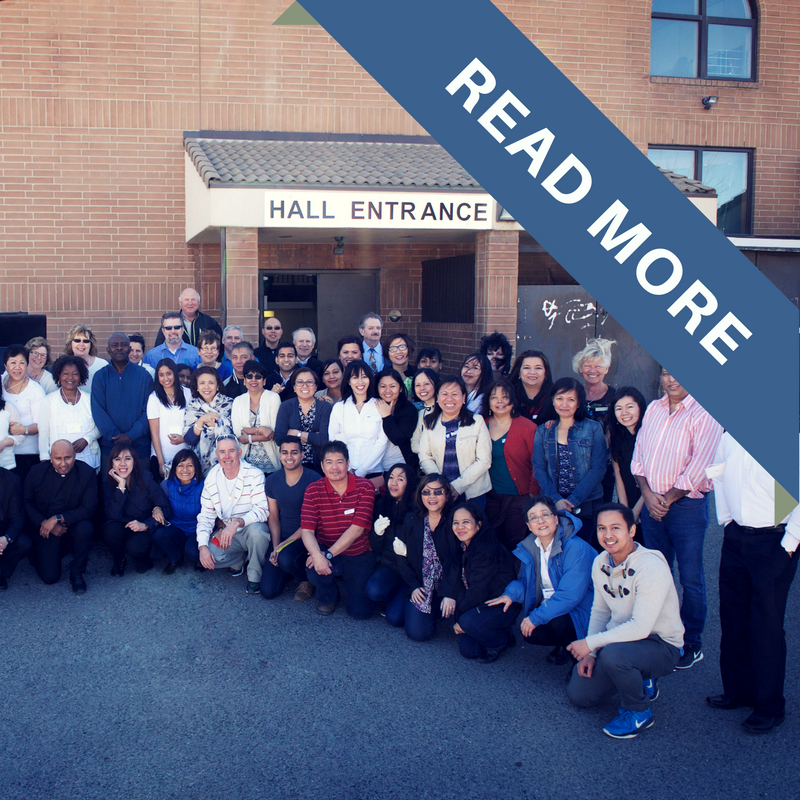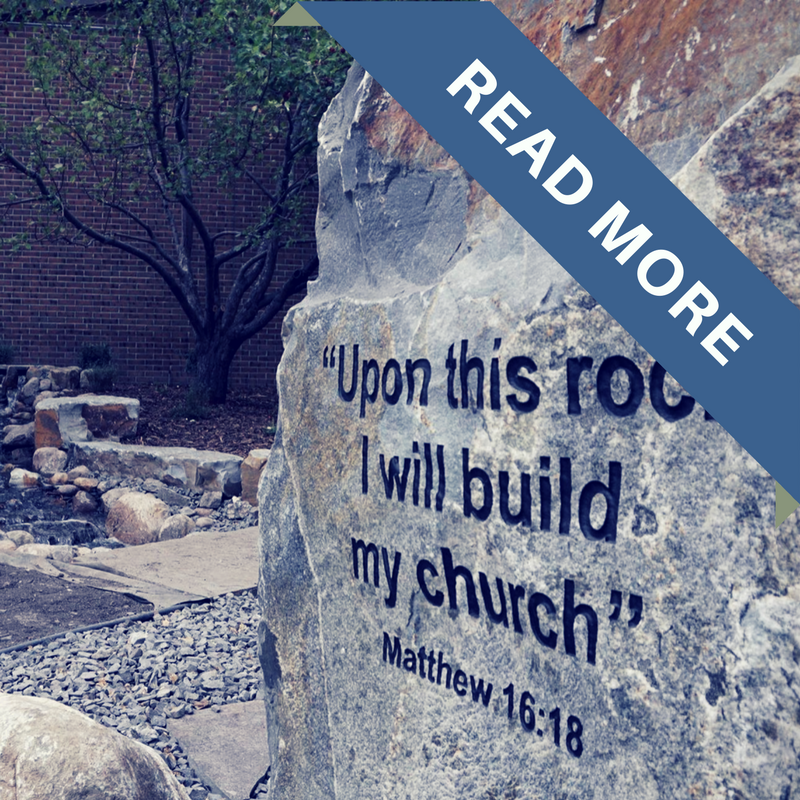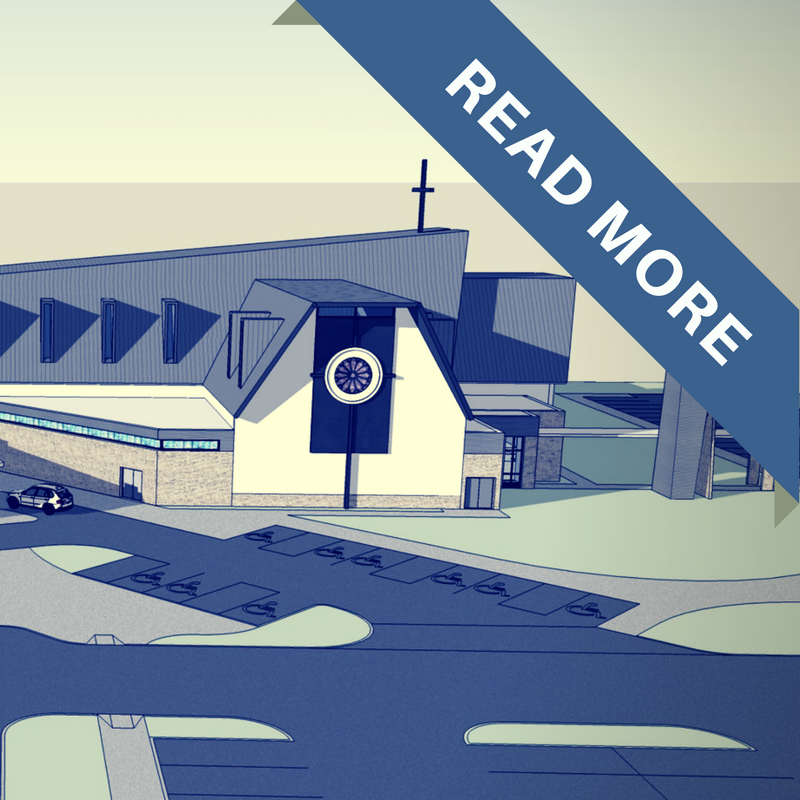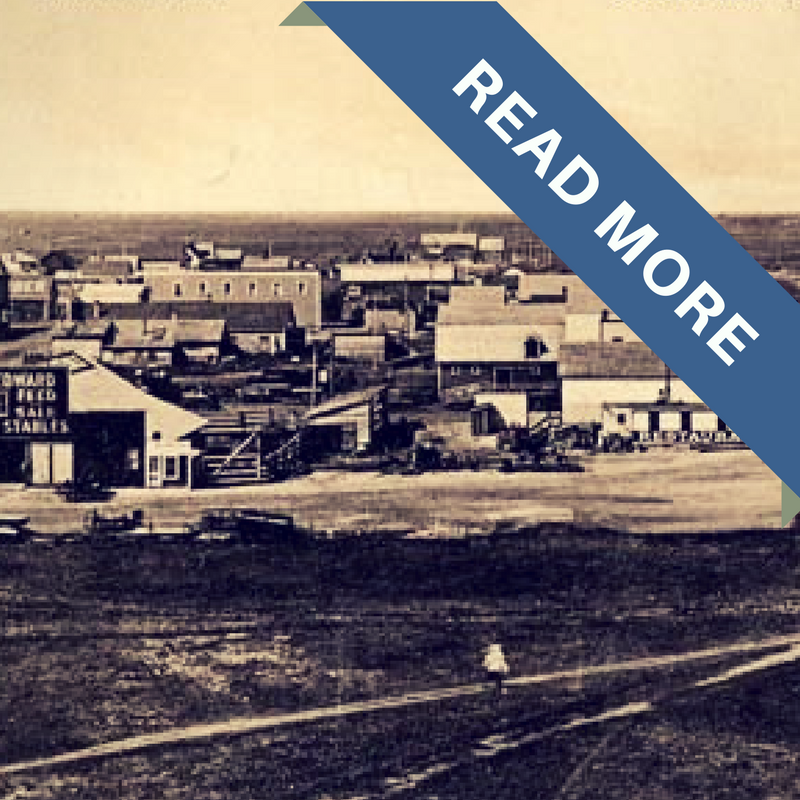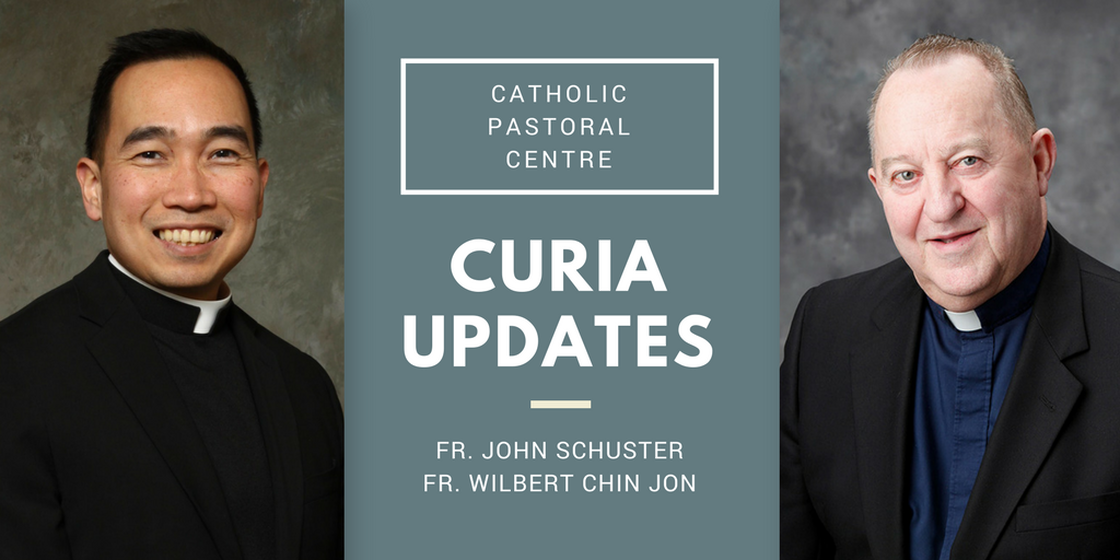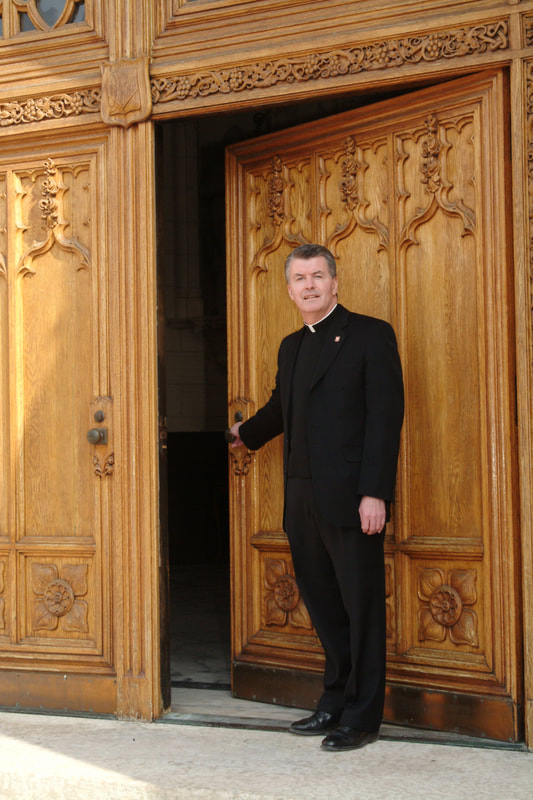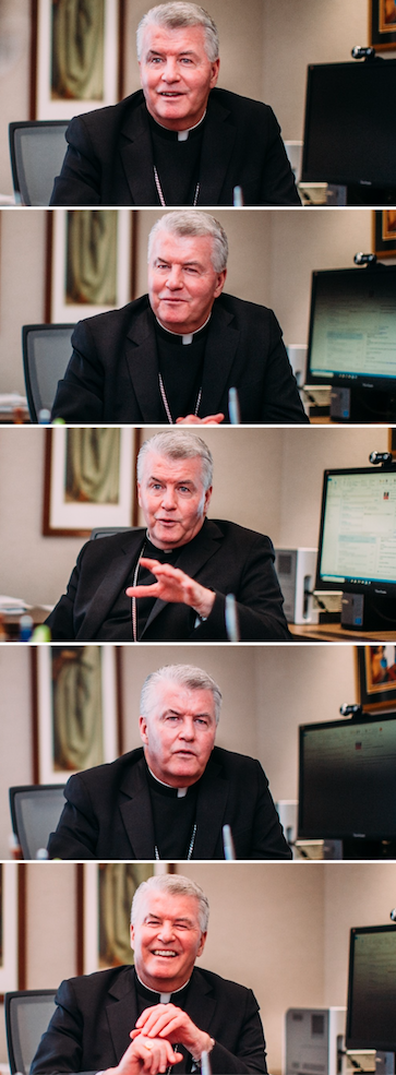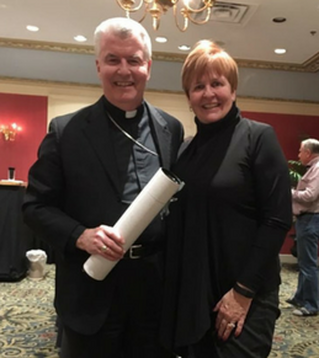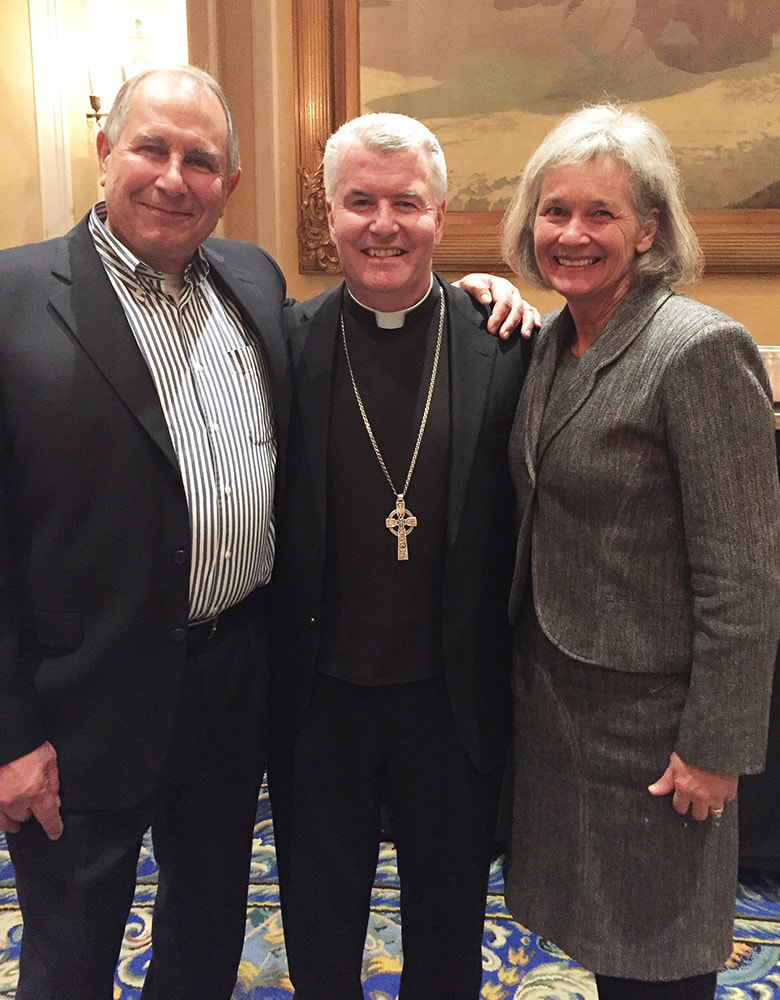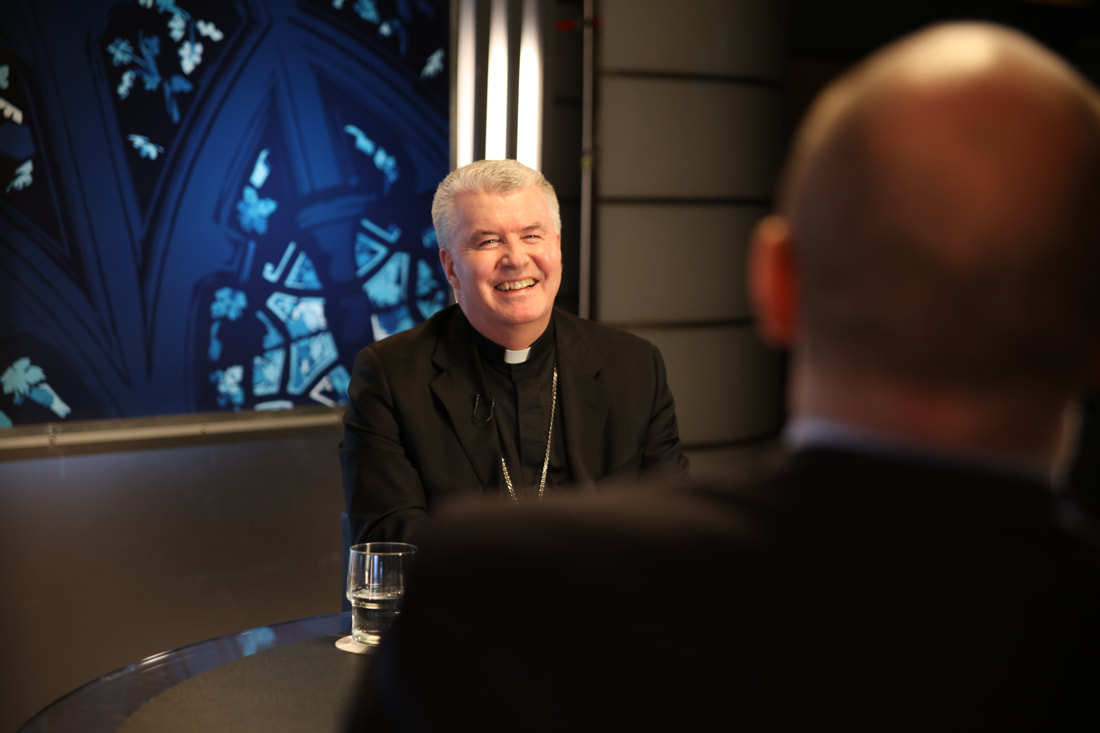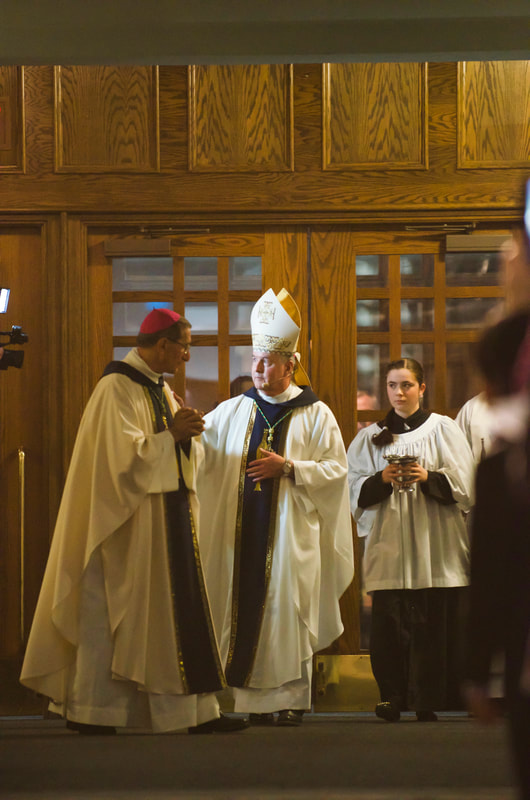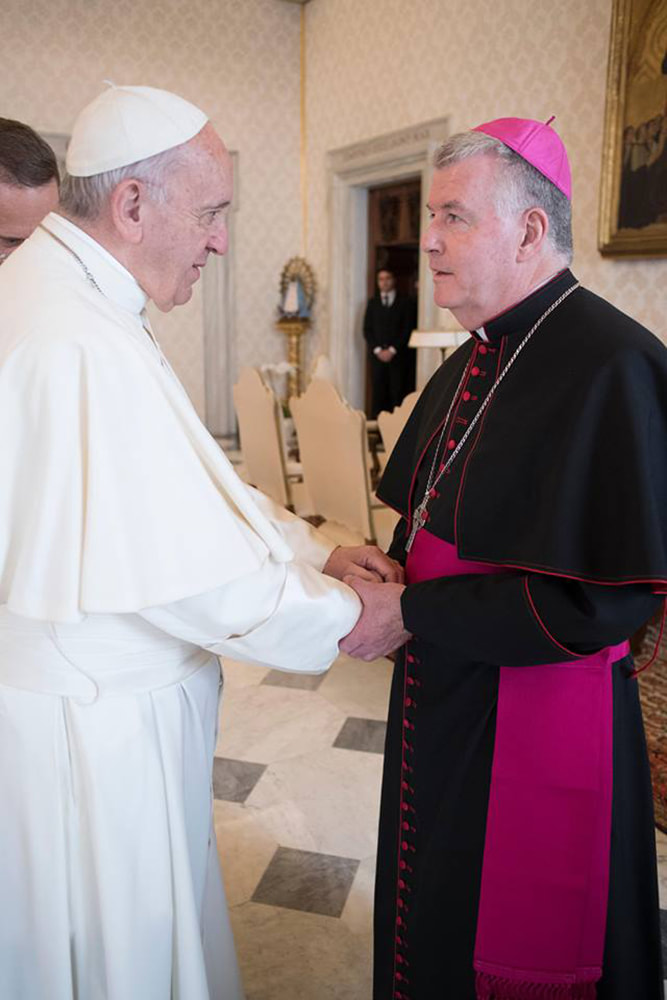Introduction
|
If you ever have the pleasure of hosting Bishop William McGrattan for supper, plan to serve pasta, brush up on your politics and history, and have the film A Man For All Seasons in your collection. You can expect His Excellency to be an equally proficient conversationalist and listener. Oh, and fair warning: if there’s a hockey game on, he might be cheering for the Boston Bruins (more on that in his profile). This is just some of what I discovered in my meeting with the man behind the lofty title.
I had been going about my day, cooking meals, folding laundry, and changing diapers when out of the blue, I received a request from the bishop’s office to interview the bishop about his first year in Calgary. “Who, me? Ahem... okay.” You can imagine my surprise. Life with four young children is busy. So busy, in fact, that I haven’t had time to do much writing lately. So when I sat down to ask the Bishop to describe his first year in a word, and he said “Busy,” I felt that we were somehow already on the same page. And so the two of us, both living out our different (yet equally important) vocations, set about our conversation. I would characterize our meeting as an encounter. From the moment I entered his office, he was fully present. |
Our conversation felt so natural that I even ditched my notes; everything just seemed to flow. His warm, humble presence created a comfortable, inviting atmosphere. It almost felt like a chat with an old friend, catching up on life.
Looking around his office, I noted two large bookshelves filled with a diverse assortment of books. Religious paintings and statues adorned the walls; each one received as a gift, which he said helps to fill his (modern but otherwise typical) office space with beauty. Next to two statues of the Good Shepherd, a framed Scripture passage from Proverbs 3.5: "Habe fiduciam in Domino ex toto corde tuo et ne innitaris prudentiae tuae." composes the bishop’s motto translated from Latin as: ‘Trust in the Lord with all your heart, and do not rely on your own insight.’ It is this trust in the Lord that has led him away from the familiarity of his home province of Ontario on an adventure out West to Alberta. He has spent much of his first year on the move, visiting the diverse people and places that comprise the Diocese of Calgary. It’s nothing new for McGrattan, who has been in motion for the last seven years, with three different jobs as Auxiliary Bishop of Toronto, Bishop of Peterborough and now, Bishop of Calgary. However, it’s clear that whatever his path, he is guided by obedience to his call and his love of God. |
|
|
At the end of our second meeting, I followed standard journalistic practice and asked if there was anything else he would like to add that may have been missed. “No, I don’t think so. I trust you,” he said.
After two separate hour-long interviews, I really felt like, in fact, a mutual trust and respect had been reached. We walked down to the lobby together, both on our way back to our respective duties, he wished me God’s blessings in my vocation, and I echoed the sentiment back to him. On my way home, I reflected that with Bishop McGrattan at the helm, I feel excited for the future of our diocese and also for my own future as a disciple of Christ. |
A Year in Review
|
In the quiet of a small parish on the Tsuut'ina Nation, about 20 people sat waiting for Mass to begin. Through the eyes of Bishop William McGrattan, these parishioners appeared peaceful, contemplative and recollected in one another’s presence.
Since moving to Calgary, McGrattan has visited many parishes and met thousands of people, but what most struck him was the sense of community at the sign of peace, and the profound reverence with which these parishioners prepared to receive the Eucharist because of their reverence for one another. “I was expecting something like the celebrations in some of our urban and rural parishes,” said McGrattan. “It was a gentle reminder to me that you cannot go into a community and impose or expect that they are going to be expressing their faith and sense of community in the same way as others.” This intimate look at parish life characterizes much of McGrattan’s first year in Calgary. He is a bishop who prioritizes pastoral relationship. And he wants one with each of us. He takes his role as shepherd seriously, but knowing he cannot singlehandedly meet the needs of each of his 400,000 sheep, he is strengthening his relationship with his priests so they can strengthen relationships with their parishioners. But it doesn’t stop there. He thinks big. He wants to build relationships between parishes, and even other dioceses across Canada. So to start, he’s spent this last year building relationships one meeting at a time. “I honestly do believe that meetings are important,” said McGrattan. “It’s communion, it’s listening, its dialogue, it’s being open to other people and their ideas.” “The Bishop is the shepherd who is called to care for the needs of those who are gathered and scattered,” said McGrattan. “It is sometimes a demanding experience of being a sentinel, a watchman, needing to know where we are going, but also listening to those who are living the Catholic faith, and to let those experiences inform me of where the Spirit is calling the diocese to in the future.” His approach is influenced by Pope John Paul II’s spirituality of communion, described in his apostolic letter, Novo Millennio Ineunte. It encourages dialogue between pastors and faithful, recognizing the gifts of each and appreciating the value each person adds to the Church. “You don’t look to the other as someone you are in competition with, you first look to see the gifts that they possess, and that those gifts are part of the gifts of the community.” McGrattan has appreciated the friendship and support of retired Bishop Fred Henry during this year of transition. Out of fraternal support, Henry has offered to make himself available only when asked, and McGrattan has indeed sought his wisdom. McGrattan has brought his gifts as former rector of St. Peter’s Seminary for 12 years to Calgary by delegating roles of leadership to empower his priests. There are now priestly vicars overseeing lay associations, religious communities, permanent deacons, education and international priests. “The importance of delegation is not just to get work done, but to receive support, to receive input and ideas. Delegation isn’t just one way,” said McGrattan. “Someone described me as always being able to lead from within, not from behind, or not in front, but an ability to know best where my presence and voice are needed.” McGrattan has also spent a lot of time meeting parish communities across the diocese. He’s made nine pastoral visits to parishes’ and the schools, nursing homes and hospitals they serve. These are three-day visits where he celebrates Mass and gets to know the parish by speaking with everyone from altar servers to Knights of Columbus members; administrative staff to clergy. This has been his practice since he was first ordained a bishop in 2010. Since then, he’s made 68 pastoral visits. His goal is to continue making 10 per year. In Calgary, he’s visited St. Mary’s Cathedral, Holy Spirit, St. Michael’s and St. James. Outside Calgary he’s visited Lethbridge, Chestermere, Strathmore, Okotoks and Drumheller. He goes to Airdrie in June. He’s made a number of observations during his visits. Vertical Divider
|
|
A pastoral plan process for the diocese is in the works, and this will support the collaborative development of a new Pastoral Plan for the Diocese in the next two to three years. Currently, McGrattan is focused on planning for the future of the Catholic Pastoral Centre. He wants it to better serve the parishes, as part of a bigger plan to form and empower missionary disciples.
“The resources we offer to the diocese will contribute to the forming of what Pope Francis calls missionary disciples. Disciples are those who have encountered Christ and in that encounter recognize the call to reach out to others.” |
Looking Back
|
A sheet of ice, a pair of skates, a stick, and a puck. These are tools that God used to build a young Ontario boy of Irish-German descent into the man he is today: the 8th bishop of the Diocese of Calgary.
“Growing up, I loved the winter because we had a hockey rink in the backyard and it was shared with our neighbours, so it was a huge rink,” said Bishop William Terrence McGrattan. In order to play hockey before school with his classmates at St. George’s Public School rink, his father suggested he might consider going to morning Mass first. And that’s how hockey hooked him into regularly attending daily Mass as a 10-year-old. “God works with many of our natural experiences to draw us in,” said the 61-year-old London, Ontario native. A sports fan and athlete to this day. He is also a lifelong supporter of the Boston Bruins, who held pre-season training camps in the bishop’s hometown during his youth. The smell of grass clippings and autumn leaves, peanut butter cookies and apple pie are reminders of the home where his faith took root. Known as an excellent baker, the neighbourhood kids would come around for a taste of his mother Mary McGrattan’s homemade goodies. She was a steadfast presence in the home while his father Terrence, a pharmaceutical representative traveled throughout the week. Cutting grass in the summer and raking leaves in the fall are some of the chores his father assigned to instill in him a conscientious work ethic. McGrattan’s diligence continued into his teenage years. In Grade 7, he would set his alarm for 5 a.m., waking to deliver newspapers. Then in Grade 8, he began a house painting company for eight years that would pay his way through high school and university – at that time, Grades 11-13 were not publically funded in Ontario. He was the first in his family to go to university, earning a Bachelor of Engineering Science degree in four years by taking night and summer classes. The 22-year-old began his professional career and worked just three years before entering St. Peter’s Seminary. In his last year of work he wrestled intensely for six months, trying to figure out if he had a priestly vocation. |
|
“I realized I was running away from what God was asking me to consider. I realized I couldn’t keep running.”
“It was a period of darkness – desolation. There was no consolation whatsoever. It was a real sense of ‘why am I having these recurring thoughts?’ I’m not necessarily wanting to choose this.” With the guidance of his regular confessor, he came to terms with the idea that God may be asking him to consider the priesthood. “Once I accepted that, there was a lifting of this heaviness, doubt, anxiety, and I felt more peace. God does work in desolation. It’s not always the mountain top consolations where we discover God’s will.” said McGrattan. In retrospect, he attributes much of his initial formation to his father. McGrattan was inspired by the way he lived his life, his work, and his commitment to family and faith. Terrence McGrattan’s outlook on life was shaped by the death of both of his parents at age six, leaving him in the care of his elder sister. He held fast to his faith, and raised his two children to know, love and serve God. He allowed room for choice, but in the McGrattan household, Sunday Mass was non-negotiable. My father “was very good about knowing what constitutes sufficient freedom while at the same time instilling responsibility. He’d say you can stay out as long as you want on Saturday – this was in my teenage years – but, we’re going to Mass at 9 o’clock. There was something about that directness that I just respected.” His father sat in the same spot behind the pillar at church so he couldn’t see the priest. “One Sunday after Mass I said, ‘I’ve watched you for years. You do the same thing, you sit behind the pillar, you close your eyes, and you don’t listen.’ And that began my catechesis because I came to understand that he intently listened to the sermon…. I attribute him with breaking open the Word.” |
|
They would come home after Mass, eat breakfast and discuss the priest’s homily at length, interweaving politics and social issues. It was in these discussions that McGrattan grappled with questions about the faith in such a way, he didn’t feel the need to question his faith later in life.
Besides his parents, who have since passed away, there are other key relationships that have shaped and supported him. While Bishop William McGrattan is known as His Excellency today, his close friends simply call him Bill. He speaks affectionately about his only sibling Theresa, a year and a half his junior. She came through town for a weekend in March. Both huge hockey fans, they cheered on the Calgary Flames and enjoyed the company of mutual friends at a dinner party. In fact, she is still dear friends with one of McGrattan’s former girlfriends, with whom he was in a serious relationship for five years during high school and university. “I would always raise the issue of having children. I jokingly said to my girlfriends that I’d really like to have a hockey team – six kids. My sister said that was the death nell in the relationship,” he laughed. “I probably would have loved a larger family. There are friendships that have not taken the place of that, but have sufficed.” McGrattan’s buddy Francis McKee is one of those close friendships. They were high school tennis partners and university chemical engineering classmates. As 15-year-olds, they tossed around the age old question: what do you want to be when you grow up? McGrattan has no recollection of telling his friend he wanted to be a priest, but that conversation remains a vivid memory for McKee, now Fr. McKee, serving in the Archdiocese of Montreal. They still get together every summer. “When we get together we both say that even though the years have gone by it’s almost like you pick up where you left off. I’ve found that with a few priests in the London Diocese as well,” said McGrattan. “There is the commitment to celibacy, but friendships are important. Good friendships are ways in which we are known, as God knows us.” |
|
One friend from university is so close, they call themselves brothers. Like a true sibling, Andrew Sarkany wasn’t afraid to vociferously challenge McGrattan all the way through the seminary until he was ordained 30 years ago, on May 2, 1987.
“We’re like brothers. I never had a brother and neither did he. It’s a long standing friendship. He’s a dentist, and when I was working he was always trying to get me to go out with one of his dental hygienists. He always questioned my decision to consider the priesthood when I was in the seminary. When I was finally ordained, he was my biggest supporter and advocate.” McGrattan only spent three years in parish ministry in Chatham Ontario, before traveling to Rome to complete a two year masters degree in fundamental moral theology at the Pontifical Gregorian University. Upon return, he served as an associate professor on faculty at St. Peter’s Seminary for five years and as rector for another 12 before being appointed bishop. McGrattan emailed Sarkany early morning the day his first appointment as bishop would go public. He got a surprise visit that same morning at the seminary chapel from his old friend who had cancelled all his dental client appointments to come see him. “Is this what you want?” asked Sarkany. “I said, ‘Andy, it’s what the Holy Father wants, and it’s what I am called to do.’ He said, ‘I just wanted to come over and see my brother to make sure.’” Then he went back to work. But it should come as no surprise that the most important relationship he maintains is the one he has with the Lord. |
|
“One time, I was in a Grade 4 class and one little girl asked what is the most important thing you do each day. I stopped for a moment, and I said the most important thing I do is pray. Not that my prayer is any better or more fruitful, it’s just a commitment I make daily for an hour each morning and often throughout the day.”
He established a disciplined prayer life during his time at the seminary. His prayer time includes the Breviary, daily Scripture readings of the day, giving thanks, offering petitions from the previous day, doing an Ignatian examen of conscience, and quieting his mind to listen to the Holy Spirit. Most importantly for McGrattan, it’s encountering Christ in the Eucharist, just like he did attending daily Mass as a school boy. “Pope Benedict said that we have to trust it is God who is leading us, not ourselves. That only comes in prayer, in praying with Scripture, celebrating Mass, being attentive and inspired by that prayer (Mass) which is central to who we are as Catholics.” |
The Phone Call from the Nuncio
|
When Bishop William McGrattan told his sister Theresa he was moving to Calgary, she joked “Seven years and three moves! You can’t hold a job!”
This is the life of the ordained priest. Obedience to where God calls entails a life of new adventures. “Picking up and going, after having established relationships, is a sacrifice. Close friends and family have accepted that this is part of my life and they actively don’t question it, they just support it. I have a sister like that,” said McGrattan. He was appointed Auxiliary Bishop of Toronto eight years ago, and then four and a half years in, he was reassigned as Bishop of Peterborough. Almost three years later, he received another call. The Nuncio, Most Rev. Luigi Bonazzi asked McGrattan to arrange his schedule to meet him at his Ottawa residence in three days’ time. He didn’t explain why. The Nuncio is an ambassador. The Holy See appoints a bishop to Canada to establish good diplomatic relationships with the Vatican and to advise the Pope about priests who would be good candidates for bishops in Canada. Bonazzi greeted McGrattan very warmly and gave him a letter from Pope Francis to read in the chapel. He said he’d return in 15 minutes. McGrattan opened the letter. It said the Pope had accepted Bishop Fred Henry’s resignation because of health reasons and was appointing McGrattan in his stead. “So I sat there, I looked at Our Lord in the Blessed Sacrament, and I basically went back over my life. I said yes to being a priest, and then petitioned the Church to accept my yes. And then they asked me to say yes to becoming a bishop, and after that, I just know that I have to say yes. It is the sense that the Lord has always been there when I had said yes before, and so again I just trusted when I say yes things will work out.” “Did I know Calgary? No. Did I know what I was coming to? No. And this is part of a life of obedience, when you do get the call, you don’t know where you are going to go.” “I think priests and bishops draw strength from just being able to say yes. It sounds scary to certain people when we invest so much energy and value in our freedom, to say we’re going to let it go." McGrattan compared freedom to that of opening and closing a door. The fullness of our freedom can only be reached by opening the door to new possibilities, but at the same time knowing that we are closing it to other ones. “There’s a deep peace when I look back and say I didn’t necessarily choose my path. I am able to say with humility and confidence that this yes was Your will and not mine. |
|
Trust in the Lord with all your heart and do not rely on your own insight.
Proverbs 3:5
|
QUICK LINKS |
FAITH & LIFE |
HOW TO HELP |
